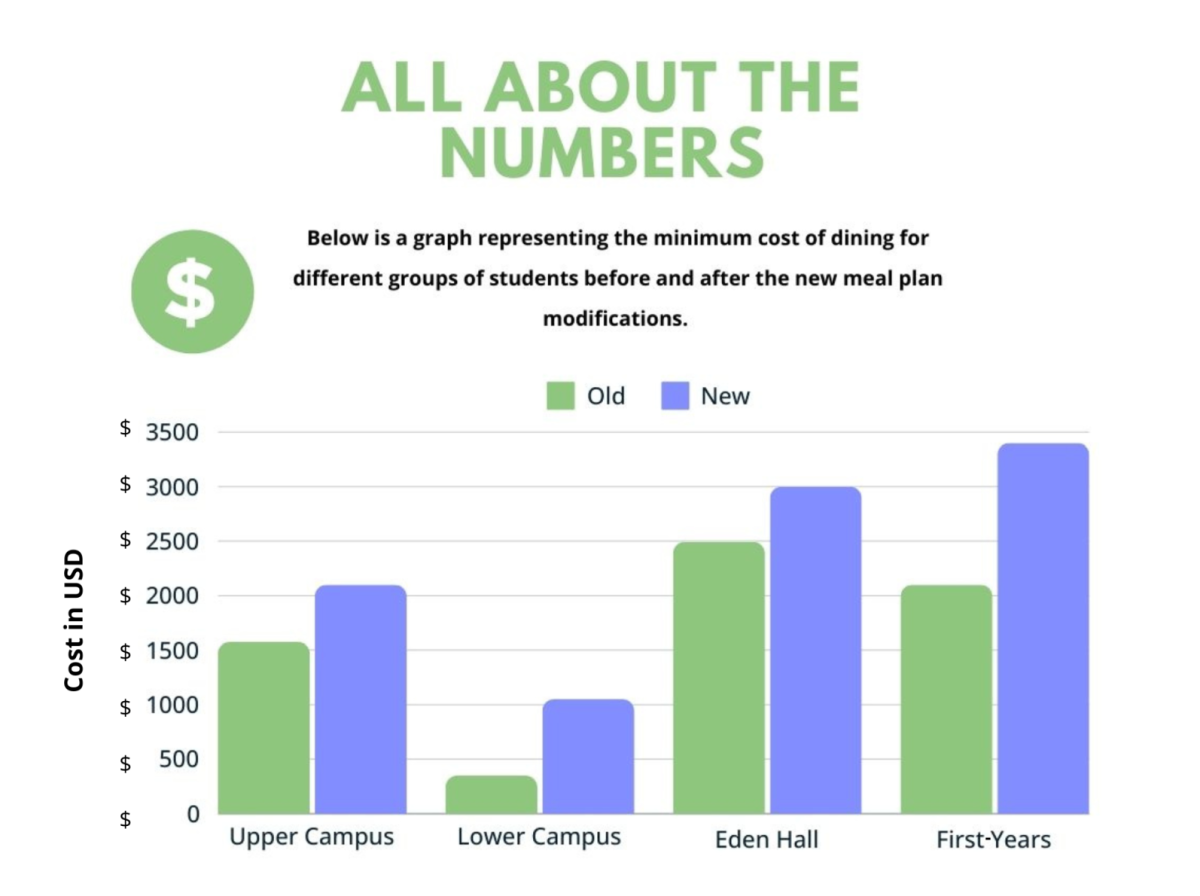If you opt for more affordable brands, I calculated the average cost of a serving of ramen is about 0.23 cents. A peanut butter and jelly sandwich costs approximately 0.28 cents to craft in your kitchen or dorm. On the other hand, the average meal from Parkhurst Dining is a little over $12. While eating ramen or a PB&J for every meal isn’t the most nutritious or enjoyable choice, recent modifications to meal plan options make other students and myself wonder: is the rising cost of dining—and living—at Chatham worth it?
Chatham announced significant changes to the dining program for the upcoming academic year in an email on Feb. 26. The original roster of undergraduate meal plan selections dropped from 11 choices to just six, and first-years living on campus are now required to pay for the Chatham Unlimited Plan, costing them $3,400 a semester for 21 meals a week and $50 in Flex.
These changes restrict students’ flexibility to make their own decisions regarding dining, reducing financial freedom and taking away their ability to budget and determine the best dietary decisions for themselves.
A perfect example of this is how students living in the Lower Campus apartments, despite paying for a kitchen, are required to spend a minimum of $1,050 per semester for four meals a week and $250 in Flex.
With a full kitchen, there is no essential need for an expensive meal plan. In fact, it’s counterintuitive, as students paying for an expensive meal plan and a kitchen lose the financial freedom to buy groceries for cooking with—thus paying for a kitchen that isn’t able to be used to its full extent.
For instance, students needing access to early or late night meal options do not have the opportunity to use their meal plans consistently. This is particularly true for some Chatham sports teams. Teams may not have access to breakfast or dinner on campus due to practice times and limited hours. These limited times for dining options restrict students that must pay for a meal plan from using them.
Increased financial costs can have inequitable impacts on students already at a financial disadvantage, causing increased stress and the possibility of missing out on academic opportunities as they must prioritize affording college over experiencing it.
The University wrote in the email announcing the changes that these changes are meant to “enhance food security for all residential students.” But this doesn’t, particularly when forcing first-years to spend almost $7,000 on a meal plan for their first year at Chatham.
There is an argument to be made that first-year students may benefit from a guiding hand, like a guaranteed three meals a day, when it comes to anticipating their dietary needs. While this may be true for some, a more balanced combination of meal swipes and Flex would help students better determine their preferences.
The mandatory Chatham Unlimited Plan presents an issue, however, as first-year students could benefit from making their own decisions regarding food. Choosing a meal plan simulates the essential skills of budgeting and planning that students will need well beyond their college years. Surely, if students are considered capable enough to potentially take out thousands of dollars in student loans to attend Chatham, they should be considered capable of choosing their own meal plan.
For students living at Eden Hall, there is only one meal plan available, costing them $3,000 per semester for 17 meals a week and $300 Flex. These changes stand to reduce food security because of their high cost and limited choices. Eden Hall, though improving in this aspect, also has a smaller menu of items available for purchase with Flex, meaning that there are few options to spend $300 on.
While dining through Parkhurst provides significantly more options than chicken or beef ramen packets, Parkhurst, despite their efforts, struggles to fulfill the dietary and cultural needs of all students consistently.
Currently, all residential Chatham students are required to purchase a meal plan with restrictions on which meal plan they can choose based on where they live at Chatham and whether or not they are first-years. The freedom to customize or opt out of meal plans would allow students to afford authentic cultural dining or choices that fit their dietary needs. This is especially significant for students whose cultural foods and dietary restrictions are rarely represented in college dining halls.
So, while the reasoning cited for these meal plan modifications is food security, it’s hard to believe this is the case. The University received almost $20,000 from the PA Hunger-Free Campus Grant program from the Pennsylvania Department of Education for the year of 2024, yet raises food prices and limits options for students the very same year.
I know that these changes can make individuals feel upset, scared or powerless. At times like this it’s important to remember how our student voices can have an impact.
If these changes are impacting your financial and dietary freedom, there are ways you can have your voice heard. Chatham Student Government works directly with Dr. Phillips and representatives from Parkhurst to advocate for student concerns. By attending open Senate and class meetings or directly reaching out to representatives about how you feel, you can be involved in the collaborative process. CSG is also hosting a Town Hall at 11:30 a.m. on March 27 in Eddy Theater, which is an opportunity to directly express your experience or ask questions.



